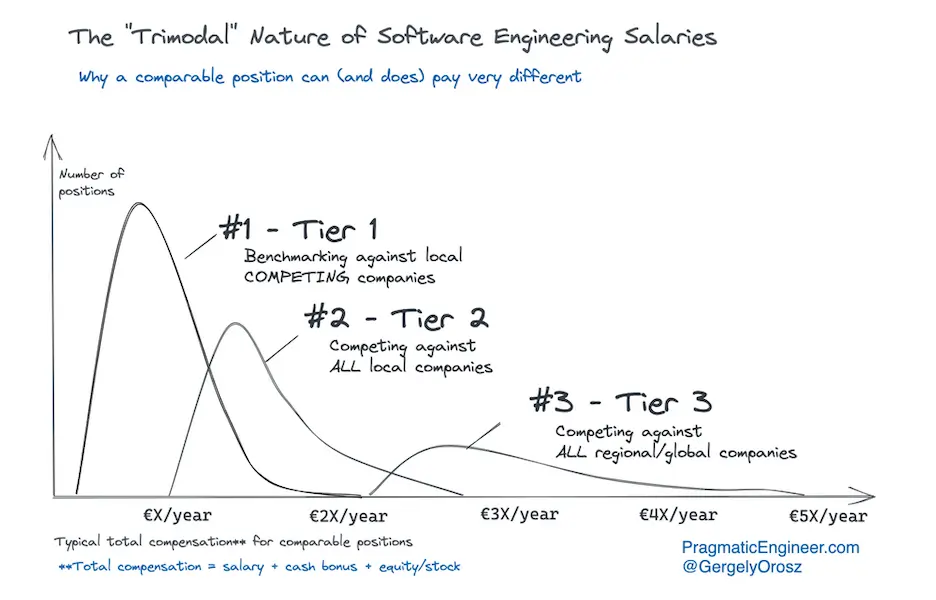One of the crucial aspects of getting an excellent software engineer salary in Germany is being well-equipped with compensation information. Not only will it help you when negotiating your wage, but also in understanding what your career growth curve could look like.
You may even decide to relocate to a city with better compensation rates, a lower cost of living, and a better quality of life.
If you’re transitioning from another industry to tech, you might identify pay scales that could take advantage of your transferable skills.
In this article, I’m going to explore the software engineer salary landscape in Germany—average salaries, the benefits and drawbacks of becoming a software engineer in Germany, and how to get a software engineering job there.
You can use the clickable menu to skip to a specific section.
- What’s the average software engineer salary in Germany?
- Average software engineer salary by German city
- Is it good to be a software engineer in Germany?
- How to get a software engineer job in Germany
- Final thoughts
1. What’s the average software engineer salary in Germany?
Defining an average software engineer’s salary is tricky. How do we find an average when companies, job roles, skillsets, regions, and cities are quite different?
Do average software engineer salaries even exist?
In fact, George Orosz, author of the Pragmatic Engineer blog, argues that there isn’t actually an average software engineer salary.
There are, however, three distinct categories of companies from which you can try to determine an average per class.

George was a hiring manager for Uber in Amsterdam for four years, so it’s fair to say he has some experience with it.
Small companies
He says that the first category belongs to companies that compare their compensation with their local competition. It’s what you might call “small mom-and-pop shops”. Startups with minimal funding and bootstrapped companies are also in this group.
The pay scale for class-one companies would generally be lower. Very few would have bonuses, and they may cap them at 10% of the annual compensation. Bonuses may also be tied to company performance. In rare cases, high-level engineers might receive equity offers.
Middling companies
The second category compares their compensation with that of all local companies, whether they’re direct competitors or not. Companies in this class might have bonuses of up to 20% of the base salary. They might also offer equity to senior engineers.
Big tech
The third group can be equated to “big tech”. These companies’ compensation is in the same league as that of regional or even global businesses. They’re likely to hire people outside their country, from the EU, and even from other countries.
They’re also more likely to offer bonuses and equity, even for entry-level programmers.
Where bonuses are tied to performance, the champions could even get 40 to 50% of their base salaries.
If you happen to join just before the companies go public, even better.
You should expect fewer open positions in category three and cut-throat competition for the same.
Top companies for software engineers in Germany
Factors like individual preferences, work-life balance, compensation, perks and benefits, work-from-home options, and pet-friendliness may result in differing opinions when it comes to what constitutes “top companies”.
In this section, we consider company size and type, financials, average software engineer salary, and perks and benefits when determining the top software companies for engineers in Germany.
I’ll using information from Crunchbase and Glassdoor for these sections.
SAP
Summary: enterprise application software
Headquarters: Walldorf, Baden-Württemberg, Germany
No. of employees: 10.000 +
Type: public company
Financials: $1.3B in funding, $10+ billion (USD) revenue
Glassdoor review rating: 4.6 stars
Average software engineer salary: €61K – €71K/yr
Perks/Benefits: home office setup support, meal allowance, training
Siemens
Summary: industrial solutions, supply chains, smart buildings, sustainable transportation, advanced healthcare
Headquarters: Munich, Bayern, Germany
No. of employees: over 10.000
Type: public company
Financials: $5.2B in funding
Glassdoor review rating: 4.1 stars
Average software engineer salary: €61K – €77K per year
Perks/Benefits: flexible working hours, employer-funded pension, training
Delivery Hero
Summary: online delivery – prepared meals, flowers, medicine, and groceries
Headquarters: Berlin, Germany
No. of employees: 10.000+
Type: public company
Financials: $9.9B funding
Glassdoor review rating: 3.9 stars
Average software engineer salary: €83K – €100K/yr
Perks/Benefits: vacation and paid time off, work-from-home options, maternity and paternity leave
Zalando
Summary: Fashion and lifestyle online platform
Headquarters: Berlin, Germany
No. of employees: 10.000+
Type: public company
Financials: €467.7M in funding
Glassdoor review rating: 3.7 stars
Average software engineer salary: €70,014 per year
Perks/Benefits: maternity and paternity leave
TeamViewer
Summary: Connectivity platform for remotely accessing, managing, repairing, controlling, and monitoring devices
Headquarters: Göppingen, Baden-Württemberg, Germany
No. of employees: 500–1.000
Type: public company
Financials: N/A
Glassdoor review rating: 3.5 stars
Average software engineer salary: €57K – €79K/yr
Perks/Benefits: vacation and paid time off, and flexible working hours
Luxoft
Summary: enhanced analytics and software engineering for enterprises
Headquarters: Zug, Switzerland
No. of employees: 5.000–10.000
Type: public company
Financials: $102.4M in funding
Glassdoor review rating: 3.8 stars
Average software engineer salary: €61K – €73K/yr
Perks/Benefits: flexible working hours, home office set-up support, training

2. Average software engineer salary by German city
Knowing the average software engineer salary in Germany by city can allow you to live in a different city while working for companies in another. This is especially true when working remotely.
Factors like quality of life, cost of living, internet speeds, the tech ecosystem, startup culture, tech hubs, coworking spaces, and potential salary growth might also result in you choosing one city over another.
In this section, we explore salary averages for software engineers in different German cities:
Berlin: €71,500
Hamburg: €64,000 (check out our coding bootcamp guide for Hamburg for more details)
Frankfurt: €65,000
Munich: €67,000
Cologne: €60,000
Stuttgart: €65,000
Berlin
According to Glassdoor, a software engineer’s average salary in Berlin is €71,500 per year, with estimated additional benefits of between €1,200 and €6,500 per year.
A senior engineer, on average, earns €80,000 per year. You’re likely to get additional benefits totaling €8,000. You could get stock options too.
Junior engineers earn an average of €47,791 per year.
The Mercer 2023 cost of living survey ranks Berlin as the 37th most expensive city to live in the world.
Hamburg
Hamburg’s average software engineering salaries are generally lower when compared to Berlin’s, according to Glassdoor data.
A software engineer in Hamburg on average earns €65,000 per year. Additional compensation can range from €2,000 – €6,165.
A junior engineer makes €55,000 per year on average, while a senior engineer makes an average of €65,548 per year, with €4,786 per year in benefits.
The Mercer survey ranks Hamburg 62nd among the most expensive cities to live in the world.
Frankfurt
Frankfurt seems to have similar salary ranges with Hamburg, at an average of €65,000 per year. Additional pay could add up to €5,000 per year.
Senior engineers earn €72,000 per year, with around €5,000 in benefits. Junior engineers earn an average of €56,000 per year.
The city is ranked 48th on the Mercer cost of living survey.
Munich
Munich software engineers enjoy a little more compensation compared to their Frankfurt and Hamburg counterparts, at an average annual salary of €67,000 per year, with additional benefits adding up to €5,000.
You can make an average of €80,500 per year as a senior engineer and €51,976 per year as a junior.
Engineers in different tech stacks have different salaries. For example, an embedded software engineer makes €64,546 per year, with €4,145 in benefits, while a C++ engineer makes €68,568 per year.
Munich is ranked 38th among the most expensive cities to live in.
Cologne
Salary-wise, Cologne lags a little behind when compared to other cities, at €60,000 per year, with around €4,000 per year in benefits.
Senior engineers in Cologne earn an average of €70,000 per year, with additional benefits of around €4,007. Junior engineers earn €50,297 per year.
Stuttgart
Stuttgart comes in strongly with competitive software engineer salaries, at €65,000 per year, and €5,000 in benefits.
Senior-level engineers make €80,270 per year on average, with €5,270 in additional compensation, while junior engineers make €60,948 per year.
Mercer ranks Stuttgart 69th among the most expensive cities to live in.
3. Is it good to be a software engineer in Germany?
If you’re considering a career as a software engineer in Germany, there are many reasons why you’d love the country.
For example, German work culture supports work-life balance, and there are many multinational companies too, which translates to lots of job opportunities.
The social security system can also cushion you if you happen to lose your job, giving you a chance to even learn new skills for free.
On the other hand, there will be so much paperwork for you if you’re not an EU citizen to be able to work in Germany. The taxes might also be on the higher side compared to other countries.
In this section, we delve into what makes Germany a great option for software engineers, including the not-so-great things.
Benefits
Let’s begin by discussing some great things about working in Germany.
Job opportunities
Germany is one of the countries with low unemployment rates. According to the Statistisches Bundesamt (Destatis), the unemployment rate in Germany is 3.1%. This points to a strong economy where there are ample job opportunities.
The countries is also home to manufacturing giants like Bosch, Mercedes-Benz, and Airbus, as well as software multinational companies (MNCs) like SAP, Luxoft, and Zalando.
Some of these manufacturing companies provide hardware parts that are widely used in other industries or by other companies, so they’d be ideal for embedded engineers.
MNCs also have lots of openings for software engineers across all levels of experience.
Some companies, such as Zalando, even have a Women in Tech program.
If you’re looking to work for startups, then Germany is a great place. Out of 1000 startups in a McKinsey survey, “Winning Formula: How Europe’s Top Tech Start-ups Get It Right”, 149 were based in Germany.
Germany also has a great culture to support entry-level roles; for example, you can be a working student, where you can work for a maximum of 20 hours a week alongside your studies. You can also work as an intern or trainee.
German software engineering salaries are also competitive, averaging between €60,000 and €73,500, as we previously discussed, with some cities paying more than others.
Work-life balance
Germany, in general, offers a great work-life balance. Your work week will be around 40 hours for a full-time job, with a lunch break of between 30 minutes and an hour. Companies that require more hours will compensate via remuneration or leave.
Particularly compared to other nations such as the United States and Britain, you aren’t likely to work more than 48 hours, according to the German Working Hours Act. If you do, you’ll receive time off or extra pay.
If you’re a parent, then you’ll enjoy up to 14 months of paid parental leave. This period can be shared between partners. The Act on the Protection of Working Mothers also offers benefits and terms for mothers.
Social benefits
In the event of job loss, you’re entitled to unemployment benefits if eligible. This can cushion you as you look for a new job or source of income.
You can also learn to code with an education voucher from Germany’s federal employment agency. If you’re on unemployment benefits, you’ll not lose this when you get the voucher (Bildungsgutschein).
Quality of life
According to the OECD, you’re likely to spend at least 20% of your disposable income on housing. Germans also have an overall life satisfaction score of 7.3, which is higher than the OECD average of 6.7.
A 1br apartment within a city center is around €836.47. It should cost you around €623.62 outside a city center. A 3br apartment would cost €1,529.81 in a city center and €1,165.62 outside a city center.
A meal in an inexpensive restaurant goes for €12, a regular cappuccino for about €3.19, and internet (minimum 60 Mbps unlimited, cable/ADSL) for €43.43. Local transport averages €3 one way, and a local half-liter draught beer costs around €5.
You can even get a €49 travel pass for public transportation (buses, trams, and trains). It’s, however, available as a monthly subscription.

Drawbacks
Let’s discuss the downsides of working in Germany as a software engineer.
German language
Being fluent in German isn’t a must, as there are companies that may still hire you even if you don’t speak the language.
You’re, however, likely to see German fluency as a key requirement in lots of software engineering job ads. So you’re better off learning the language.
You might also join a company where meetings, conversations, and interactions happen in German. Outside of work, life will be much easier if you can speak German.
The good news is that it’s possible to learn German via a state-sponsored integration course.
Work and residence permits
It’s easier to work as a software engineer in Germany if you’re an EU or EEA citizen. If you’re an EU citizen, you don’t need a visa or even a residence permit to enter or even stay in Germany. You do, however, need to register your residential address.
Non-EU citizens (Israel, New Zealand, Canada, South Korea, USA, Australia, and Japan citizens) need residence visas if they’re planning to be in Germany longer than 90 days or if they’re planning to move permanently, for work, for example.
Third-country citizens need a 6-month job seeker or employment visa.
The good news, is that finally in 2024 Germany is looking to reform its citizenship law, as well as entrance criteria for so-called “skilled” migrants.
Taxes
German taxes are higher when compared to other countries, for example, OECD member countries. In 2022, for example, Germany’s tax was the second highest among other OECD member countries.
If you have a German residence or spend at least 183 days per year in Germany, then you’re expected to pay income tax. You also make additional statutory social security payments for unemployment benefits, healthcare, pensions, and accident insurance.
On the other hand, all these deductions give you access to healthcare, education, and even unemployment benefits if you lose your income.
4. How to get a software engineer job in Germany
The job market in Germany is competitive, and getting a software engineering job depends on where you’re in your coding journey, for example, in terms of your experience and skill level.
You also need to keep your residency and work permit status in mind if you intend to work in Germany in person as a software developer.
You might also need to learn and speak German (C1 level) to increase your chances of working with most companies.
In this section, we learn about some steps you need to take to get a software engineering job in Germany. You can also check out more detailed steps for getting an entry-level programming job in our guide.
Have or build the right skillset
The first thing that you need to check is whether you have the right skillset to become a software engineer.
Having a degree may be advantageous, but it isn’t mandatory.
If you want to become a full-stack web developer, for example, skills like JavaScript, React, TypeScript, and databases might come in handy.
If you don’t have the right skillset, there are many ways to get started. You can enroll in a university or college for computing-related courses, join a boot camp, or even learn by yourself via paid online courses or free resources.
You can check out CareerFoundry’s free online five-day coding for beginners course to get a feel for what a career in tech could look like.
Getting relevant certifications is also another way to demonstrate your expertise.
Build a portfolio
Your portfolio helps you demonstrate your skills. Make sure you have a portfolio of projects, open-source contributions, technical writing pieces, community participation, and work, volunteer, or freelance experience.
In addition to having a portfolio, prepare a resume and create a profile on platforms like LinkedIn, Kununu, and Xing.
Sharing your work on social platforms, like X (formerly Twitter), and publication platforms, like Medium, dev.to, and Hashnode, also forms part of your portfolio.
Start applying
If you already have the relevant skills and a portfolio, you can start applying for work that matches your skills and experience. You can identify specific companies that you want to work for and check for open vacancies on their career pages.
You can also apply for internships, traineeships, and working student opportunities if you’re eligible.
You can check for jobs on platforms like LinkedIn and Xing. The Agentur für Arbeit also has a job board that you can check.
Reaching out to recruiters can also help. Don’t bombard them, of course.
You might want to get a jobseeker’s visa to look for work in Germany if you’re a foreigner. You might even find companies willing to relocate you if they need you to work in person in Germany or remotely in Germany.
Lastly, as you negotiate for compensation, keep average salaries and living costs in mind.
Network
Find local or online meetups, tech events, and communities that you can be part of. A great move is to participate, volunteer, get to know what challenges the community is facing, and help them solve them.
You can also help plan events and make presentations.
You could meet potential employers this way, or even people with whom you can build a start-up.
If you learned how to code through a bootcamp or school, they might have an alumni community or partnerships with employers that you can take advantage of.
5. Final thoughts
Getting a great software engineer salary in Germany is a combination of knowing the salary ranges for your level of experience, ensuring that you have the correct skillset, and applying for jobs.
Knowing salary ranges helps you determine your career growth trajectory and even which cities you can move to, increasing your chances of a higher income. You might even opt to move to a city with lower living costs.
Germany is a splendid place to build a career as a software engineer, as you can earn a competitive income by working for Europe’s biggest manufacturers and MNCs. However, if you’re not a citizen, you need to get your paperwork in order.
We hope that you’re now set to begin your software engineering journey in Germany. CareerFoundry’s Full-Stack development Program is an excellent place to start. Based in Berlin but the program is fully online, in less than 10 months you’ll find yourself going from a coding novice to a skilled developer—with a professional-quality portfolio to show for it.
If you’d prefer to read some more about software engineer and web development, check out these articles:
